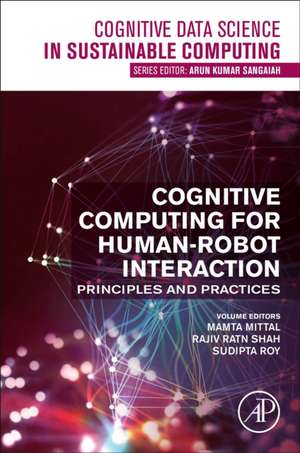Cognitive Computing for Human-Robot Interaction: Principles and Practices: Cognitive Data Science in Sustainable Computing
Editat de Mamta Mittal, Rajiv Ratn Shah, Sudipta Royen Limba Engleză Paperback – 18 aug 2021
This book discusses each of these applications, presents working implementations, and combines coherent and original deliberative architecture for human–robot interactions (HRI). Supported by experimental results, it shows how explicit knowledge management promises to be instrumental in building richer and more natural HRI, by pushing for pervasive, human-level semantics within the robot's deliberative system for sustainable computing applications.
This book will be of special interest to academics, postgraduate students, and researchers working in the area of artificial intelligence and machine learning.
Key features:
- Introduces several new contributions to the representation and management of humans in autonomous robotic systems;
- Explores the potential of cognitive computing, robots, and HRI to generate a deeper understanding and to provide a better contribution from robots to society;
- Engages with the potential repercussions of cognitive computing and HRI in the real world.
- Introduces several new contributions to the representation and management of humans in an autonomous robotic system
- Explores cognitive computing, robots and HRI, presenting a more in-depth understanding to make robots better for society
- Gives a challenging approach to those several repercussions of cognitive computing and HRI in the actual global scenario
Preț: 558.09 lei
Preț vechi: 812.73 lei
-31% Nou
106.82€ • 116.07$ • 89.79£
Carte tipărită la comandă
Livrare economică 14-28 aprilie
Specificații
ISBN-10: 0323857698
Pagini: 418
Ilustrații: Approx. 150 illustrations
Dimensiuni: 152 x 229 x 25 mm
Greutate: 0.56 kg
Editura: ELSEVIER SCIENCE
Seria Cognitive Data Science in Sustainable Computing
Cuprins
- Introduction to cognitive computing and its various applications
- Recent trends towards cognitive science: from robots to humanized robots
- Cognitive compyuting in human activity recognition by healthcare robots
- Deep learning-based cognitive state prediction analysis using brain wave signals
- EEG-based cognitive performance evaluations for mental arithmetic tasks
- Trust or no trust in chat-bots: a millennial dilemma
- Cognitive computing in autonomous vehicles
- Optimized navigation using deep learning techniques for automatic guided vehicles
- Vehicular middleware and heuristic approaches for ITS systems of smart cities
- Error traceability and error prediction using machine learning techniques to improve the quality of vehicle modeling in computer-aided engineering
- All about human-robot interaction
- Teleportation of human body kinematicss for a tangible humanoid robot control
- Recognition of trivial humanoid group events using clustering and higher order local auto-correlation techniques
- Understanding the hand gesture command to visual attention model for mobile robot navigation: service robots in the domestic environment
- Mobile robots for air quality monitoring of landfill sites using the Internet of Things
- Artificial intelligence and Internet of Things readiness: the inclination for hotels to support a sustainable envoronment
- Design and fabrication of a new multi-function smart trash bin based on the Internet of Things
Descriere
Cognitive Computing for Human-Robot Interaction: Principles and Practices explores the efforts that should ultimately enable society to take advantage of the often-heralded potential of robots to provide economical and sustainable computing applications.
This book discusses each of these applications, presents working implementations, and combines coherent and original deliberative architecture for human–robot interactions (HRI). Supported by experimental results, it shows how explicit knowledge management promises to be instrumental in building richer and more natural HRI, by pushing for pervasive, human-level semantics within the robot's deliberative system for sustainable computing applications.
This book will be of special interest to academics, postgraduate students, and researchers working in the area of artificial intelligence and machine learning.
Key features:
- Introduces several new contributions to the representation and management of humans in autonomous robotic systems;
- Explores the potential of cognitive computing, robots, and HRI to generate a deeper understanding and to provide a better contribution from robots to society;
- Engages with the potential repercussions of cognitive computing and HRI in the real world.
- Introduces several new contributions to the representation and management of humans in an autonomous robotic system
- Explores cognitive computing, robots and HRI, presenting a more in-depth understanding to make robots better for society
- Gives a challenging approach to those several repercussions of cognitive computing and HRI in the actual global scenario














